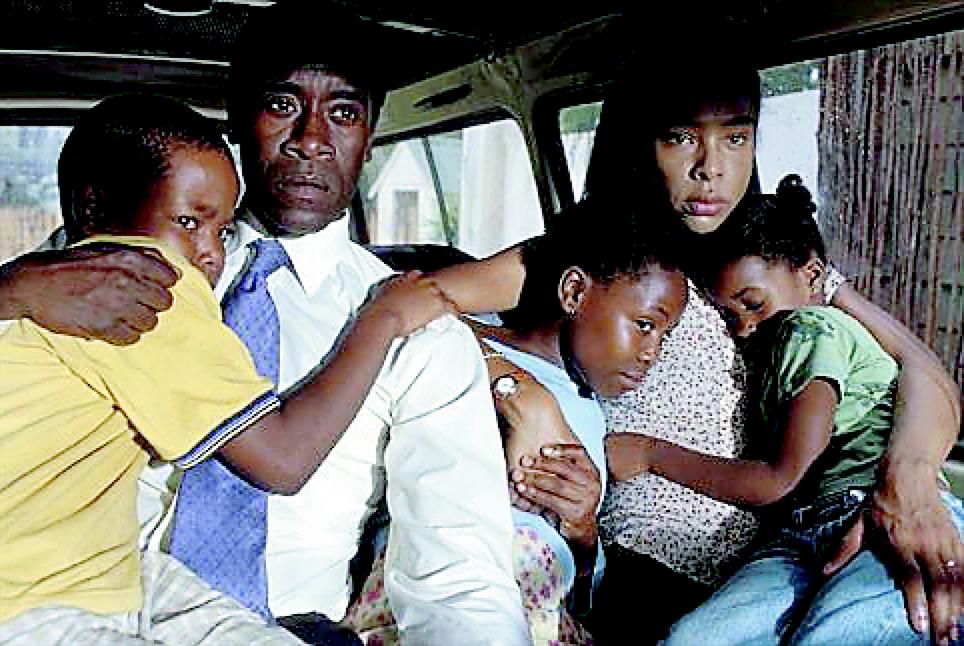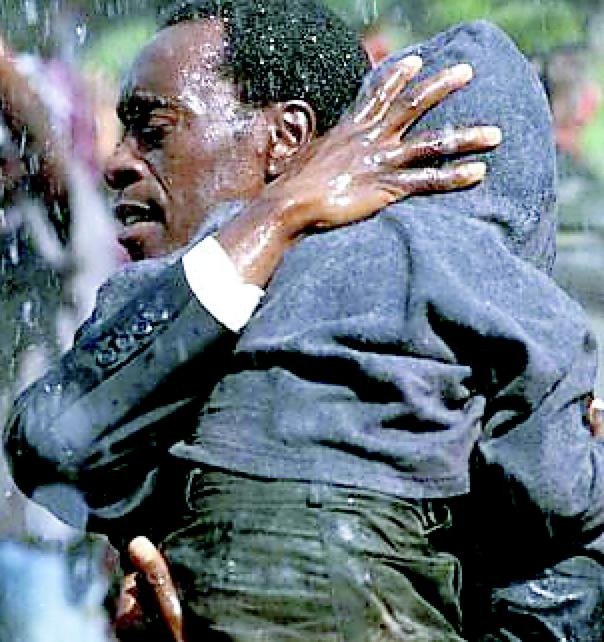The film unfolds in the mid-'90s in the east central African nation of Rwanda. The nation was founded by the Belgians, who eventually vacated, leaving behind a confused post-colonial nation. By the '90s, Tutsi “rebels” were locked in a fierce battle with Hutu militia members. As the film points out, the designations “Tutsi” and “Hutu” are not tribal or racial distinctions; they are a completely random division of the nation's population laid out decades before by the Belgians. This was a war seemingly without rhyme or reason. Virtually overnight, friends and family members were turned against each other in one of the worst bouts of “ethnic cleansing” this world has ever seen.
Hotel Rwanda tells the true-life story of Paul Rusesabagina (Don Cheadle in one of his best roles). Paul was the manager of an upscale Belgian-run hotel in the capital of Kigali. As portrayed in the film, Paul is a hard-working, apolitical man, well versed in navigating the ins and outs of society's upper crust. He knows the value of a nicely timed gift, a properly serviced guest, a local official with a well-greased palm. Paul is the kind of efficient, amenable fellow who gets things done. While he's not exactly a selfish person, he does these things knowing full well that he's building up a wealth of personal favors among Africa's most powerful people. You never know when such friendships might pay off in the unstable climate of central Africa.
Sure enough, the floor drops out from under Rwanda one day when the president is assassinated. Immediately, a war breaks out between the Tutsis and the Hutus. Paul tries his best to ignore the rising tide of violence, putting on a “business as usual” face at work. Beleaguered U.N. forces (led by a Canadian colonel played by gruff Nick Nolte) try their best to secure the hotel, but it is clear the dike is about to break.
Initially, Paul brings his family to the hotel for protection. (He is a Hutu, but is married to a Tutsi.) Eventually, with Hutu militia members prowling the streets looking for any Tutsi to behead, Paul's hotel becomes one of the only safe spots in the city. The halls of the hotel are filled with orphans, refugees, wanted fugitives. Like Oscar Schindler (as portrayed in the narratively similar Schindler's List), Paul's conscience overwhelms him, and he does whatever he can to keep these people alive. Paul's skills as a negotiator, a peacekeeper, an expert glad-hander, are put to the test. He wheels and deals and bribes everyone he can to keep the bloody Hutu forces from the doors of his hotel.
Though it lionizes the brave accomplishments of one everyday hero, the film is also interested in exposing the dark truth of the war in Rwanda. Joaquin Phoenix pops in briefly as a television journalist desperate to capture the staggering slaughter in the streets of Kigali. When those images are burned onto videotape and shown to Western powers, Paul is sure that the war will come to a swift end. Phoenix's character has to break the news to him: “People will see this and say ’Oh, how horrible!' Then they will go back to eating their dinner,” he explains. Which is exactly what happened.
Nolte also has some powerful moments as the U.N. commander scrambling to save lives and stop a country from descending into complete anarchy. Eventually, even he cannot ignore the bitter reality of the situation: Rwanda has no oil or other natural resources to interest the Western world. Unlike the Middle East or Western Europe, no help will be on its way.
Though it's light on historical and political details, Hotel Rwanda is clearly aimed at Western audiences needing a simple cinematic introduction to this complex story. In the end, more than 800,000 people were slaughtered in Rwanda. Hotel Rwanda functions as a wake-up that this chaos is playing out (and being ignored) in other African nations to this very day. It also serves as a reminder that, even in the most horrific of circumstances, there are those who will stand up and do the right thing, no matter how difficult or dangerous it might be.




